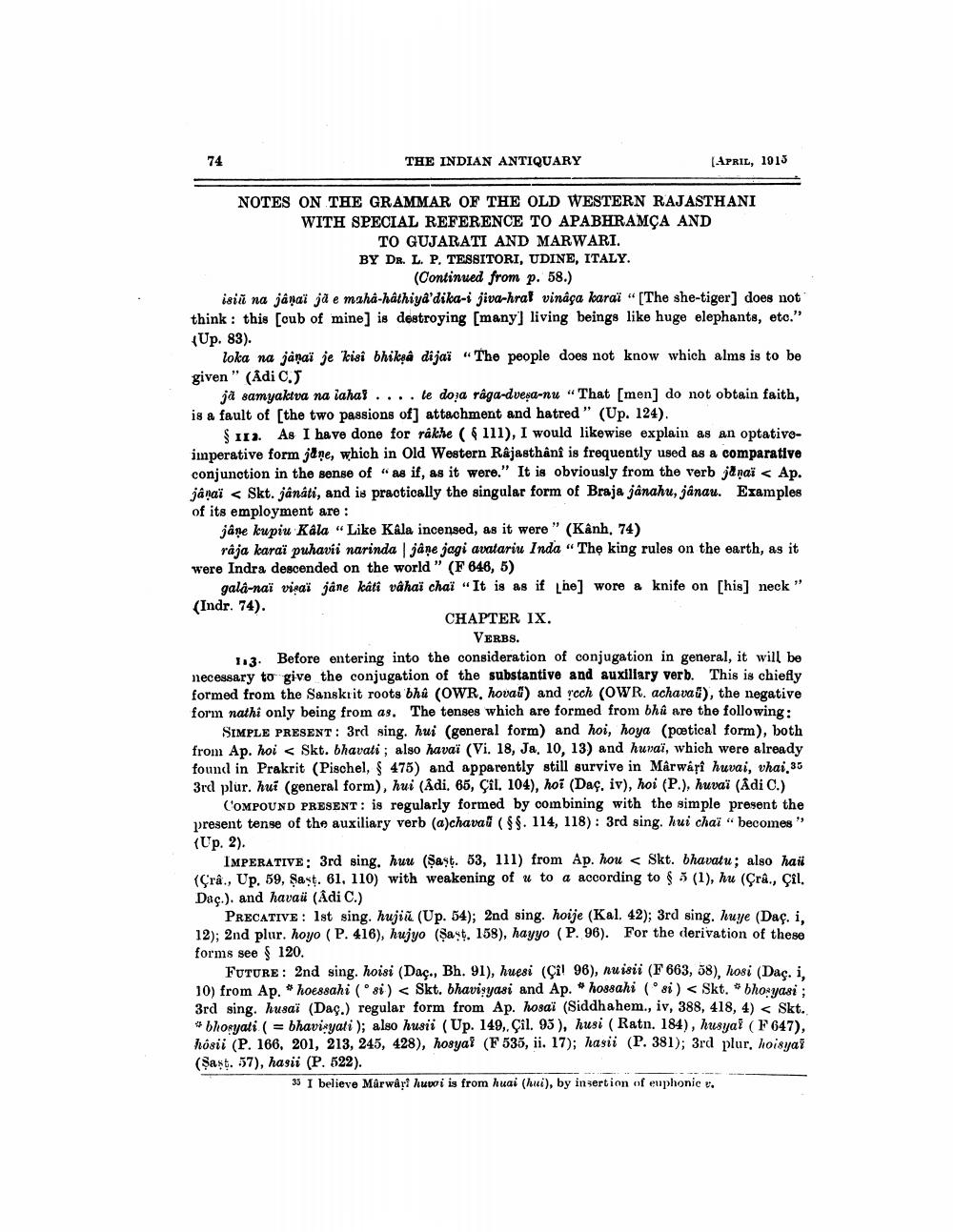________________
THE INDIAN ANTIQUARY
(APRIL, 1013
NOTES ON THE GRAMMAR OF THE OLD WESTERN RAJASTHANI WITH SPECIAL REFERENCE TO APABHRAMCA AND
TO GUJARATI AND MARWARI. BY DR. L. P. TESSITORI, UDINE, ITALY.
(Continued from p. 58.) isiñ na janai jà e maha-hathiya dika-i jiva-hral vinaga karai "[The she-tiger] does not think this Coub of mine) is destroying (many) living beings like huge elephants, etc." (Up. 83).
loka na janai je kisi bhikṣa dijai "The people does not know which alms is to be given " (Adi C.)
ja samyaktva na iahal .... te doja raga-dvesa-nu "That [men] do not obtain faith, is a fault of the two passions of] attachment and hatred " (Up. 124).
11. As I have done for rakhe ( 111), I would likewise explain as an optativeimperative form jdne, which in Old Western Rajasthani is frequently used as a comparative conjunction in the sense of "as if, as it were." It is obviously from the verb jāņaï < Ap. jánaï < Skt. janáti, and is practically the singular form of Braja janahu, janau. Examples of its employment are :
jane kupiu Kala "Like Kala incensed, as it were " (Kênh, 74)
rája karai puhavii narinda jane jogi avatariu Inda "The king rules on the earth, as it were Indra descended on the world" (F 646, 5)
gala-nai visai jane kâti vâhai chaï "It is as if [he] wore a knife on [his] neck" (Indr. 74).
CHAPTER IX.
VERBS. 113Before entering into the consideration of conjugation in general, it will be necessary to give the conjugation of the substantive and auxiliary verb. This is chiefly formed from the Sanskrit roots bhů (OWR, hovaü) and rech (OWR. achavad), the negative form nathi only being from as. The tenses which are formed from bha are the following:
SIMPLE PRESENT: 3rd sing. hui (general form) and hoi, hoya (poetical form), both from Ap. hoi < Skt. bhavati; also havaï (Vi. 18, Ja, 10, 13) and huvai, which were already found in Prakrit (Pischel, 475) and apparently still survive in Marwari huvai, vhai,35 3rd plur. hui (general form), hui (Âdi. 65, Çil, 104), hoi (Daç, iv), hoi (P.), huvai (Adi C.)
('OMPOUND PRESENT: is regularly formed by combining with the simple present the present tense of the auxiliary verb (a)chavai (S. 114, 118): 3rd sing. hui chaï " becomes" (Up. 2).
IMPERATIVE: 3rd sing. huu (Sast. 53, 111) from Ap. hou < Skt. bhavatu; also haji (Crâ., Up. 59, Şaxt. 61, 110) with weakening of u to a according to $5 (1), hu (Crâ., Çil. Daç.), and havaü (Adi C.)
PRECATIVE: 1st sing. hujii (Up. 54); 2nd sing. hoije (Kal. 42); 3rd sing. luye (Daç. i. 12); 2nd plur. hoyo (P. 416), hujyo (sast. 158), hayyo (P. 96). For the derivation of these forms see § 120.
FUTURE: 2nd sing. hoisi (Daç., Bh. 91), huesi (Çi! 96), nuisii (F 663, 38). hosi (Dac. i. 10) from Ap. " hoe88ahi (si) < Skt. bhavisyasi and Ap. hos8ahi (si) < Skt. *bhosyasi; 3rd sing. husaü (Dag.) regular form from Ap. hosai (Siddhahem., iv, 388, 418, 4) < Skt. ** bloryati ( = bhavisyati); also husii (Up. 149, Çil. 95), husi (Ratn. 184), husyal (F 647), hosii (P. 166, 201, 213, 245, 428), hosyai (F 535, ii. 17); hasii (P. 381); 3rd plur, hoisyal (Şaxt. 57), hasii (P. 522).
35 I believe Marwari huvoi is from huai (hui), by insertion of euphonic v.




